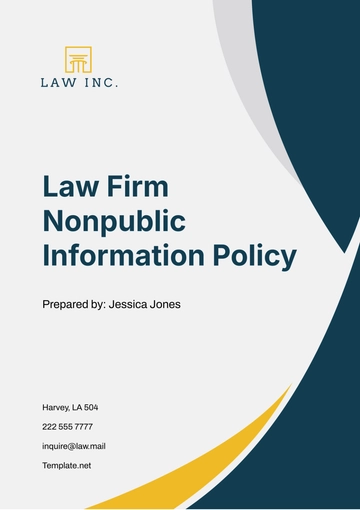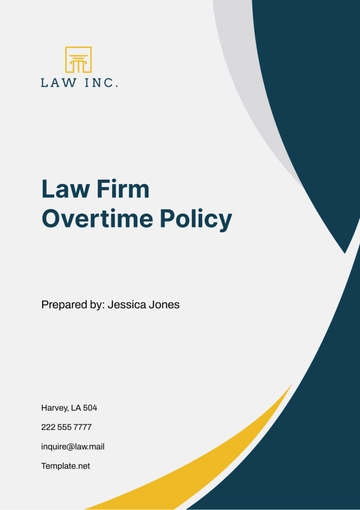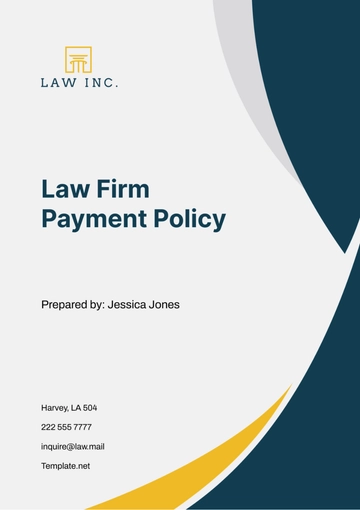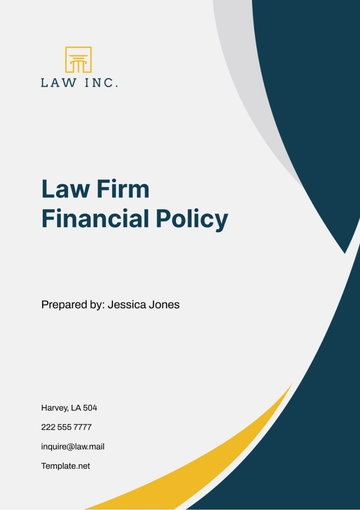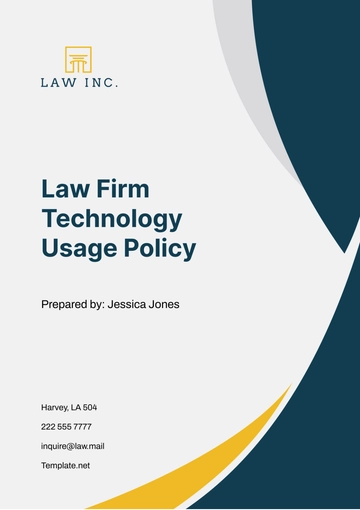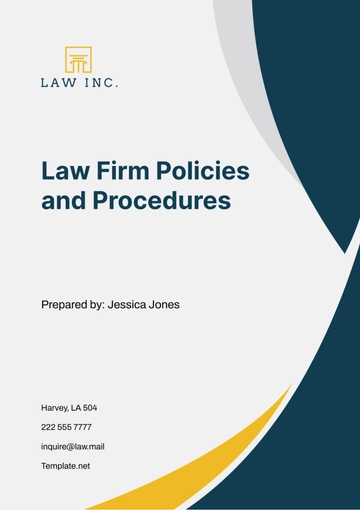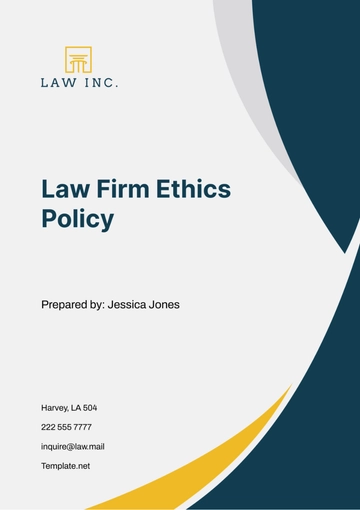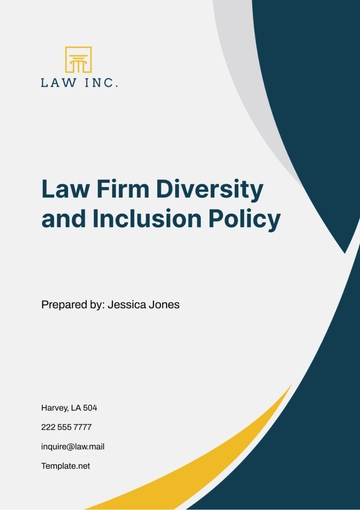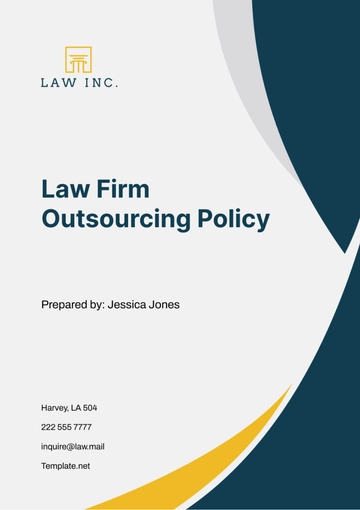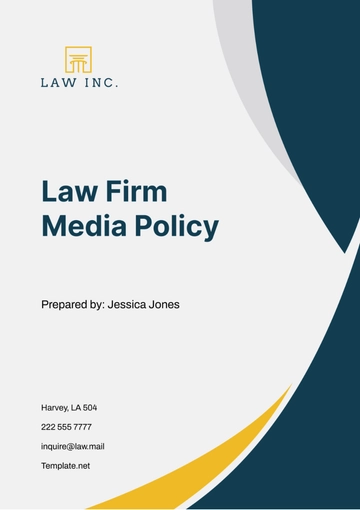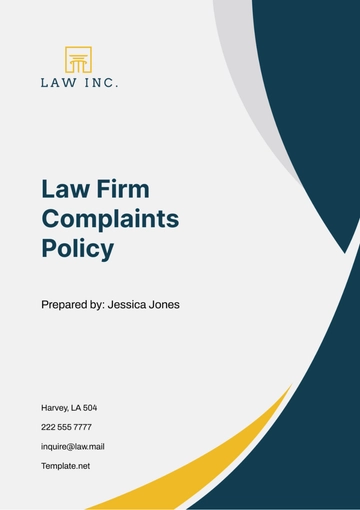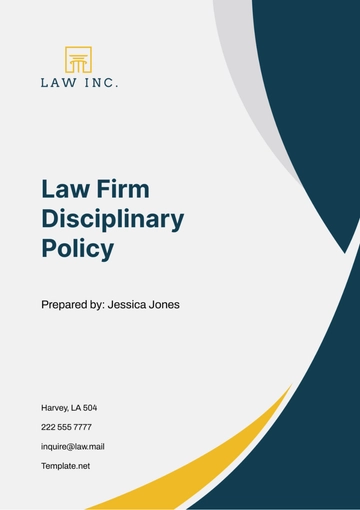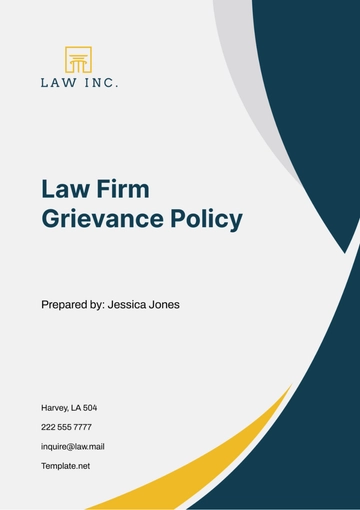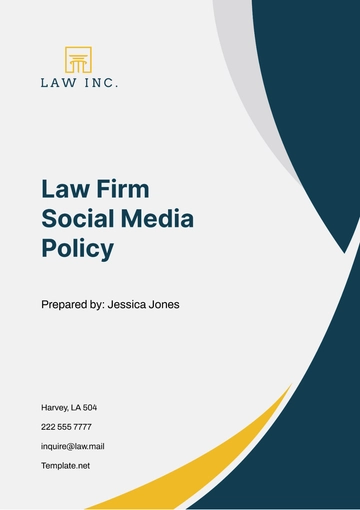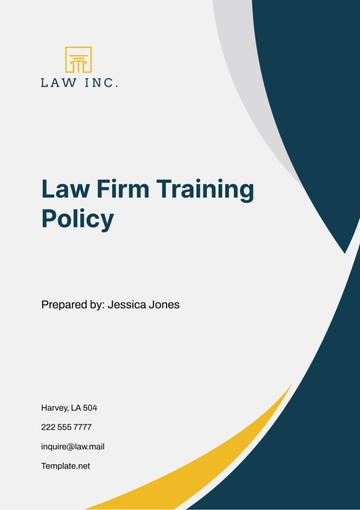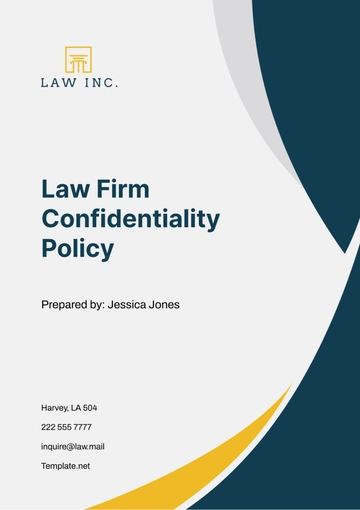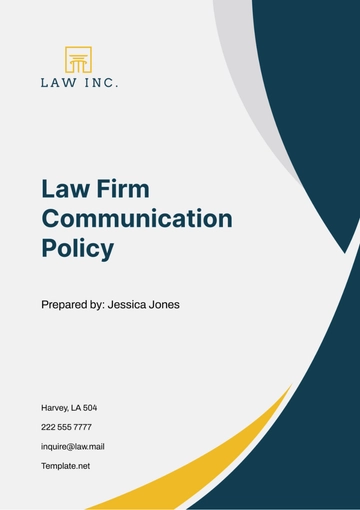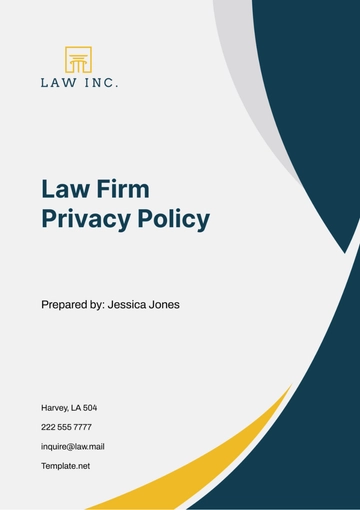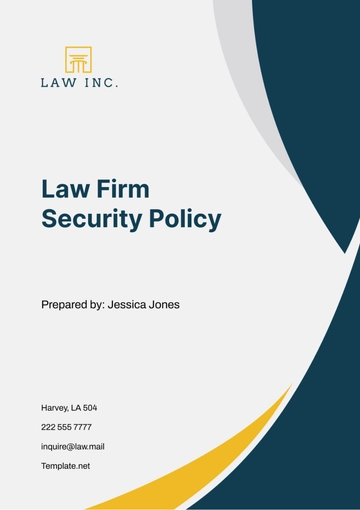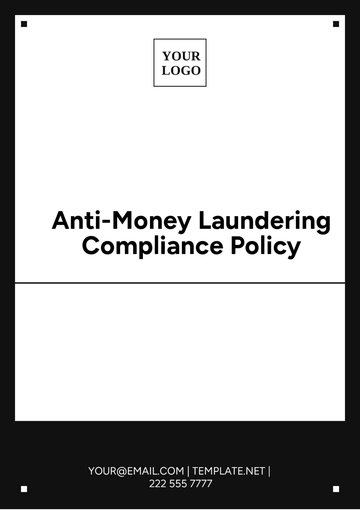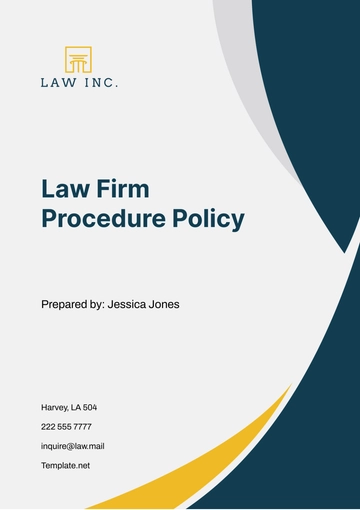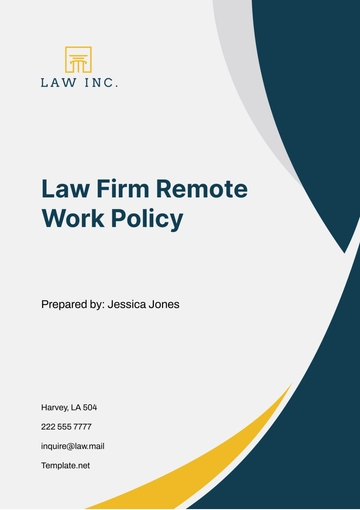Free Law Firm Outsourcing Policy
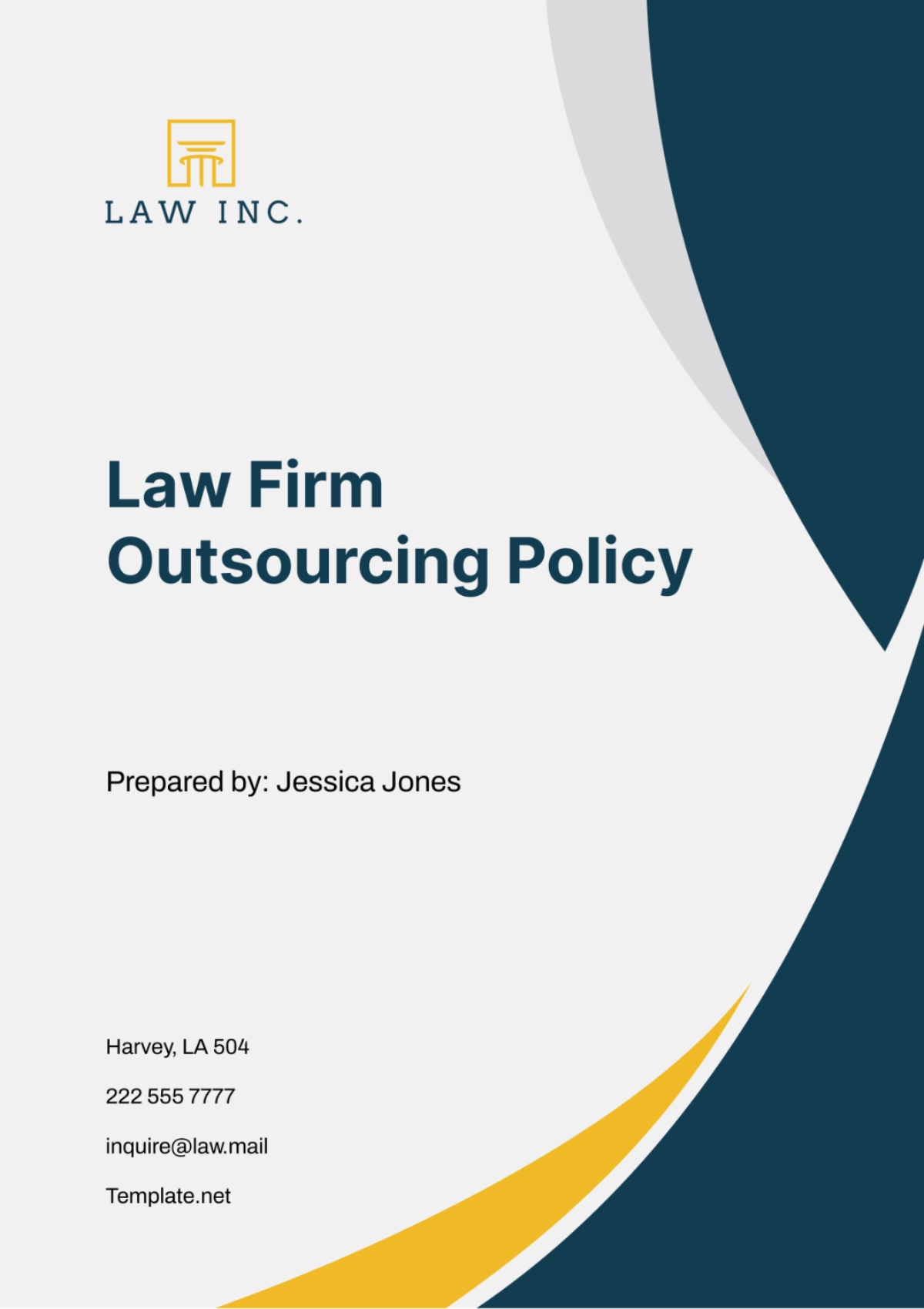
[YOUR COMPANY NAME] has established this Law Firm Outsourcing Policy to ensure that outsourcing practices are conducted in a transparent, ethical, and legally compliant manner. This policy guides our decisions and management of outsourced services, aligning them with our firm’s standards, client expectations, and regulatory requirements.
1. Objective
The core aim of this policy is to harness the benefits of outsourcing by optimizing operational efficiencies and enhancing the quality of service delivery through strategic partnerships. This involves selectively outsourcing non-core functions to specialized vendors who can provide high-quality services more efficiently. By doing so, [YOUR COMPANY NAME] intends not only to uphold but also to enhance its reputation for excellence and integrity. A critical aspect of this policy is ensuring that all outsourcing activities strictly adhere to the highest standards of client confidentiality and are compliant with all relevant laws and regulations. This careful oversight helps to mitigate risks associated with outsourcing, aligning external services seamlessly with our firm's ethical commitments and legal obligations.
2. Scope
This policy encompasses all departments and operational units within [YOUR COMPANY NAME] that may require engagement with external service providers. The scope of applicable outsourcing activities includes but is not limited to business process outsourcing, legal support services, information technology (IT) support, and other functions that are essential yet ancillary to the core legal services we provide. By defining these parameters, the policy ensures that outsourcing decisions are made consistently across the organization and that they support the firm’s strategic objectives without compromising operational control or service quality.
3. Principles of Outsourcing
3.1 Strategic Alignment
Purposeful Outsourcing: Every outsourcing decision must directly contribute to the strategic objectives of the firm, such as cost reduction, quality improvements, or enhancement of competitive advantages. Outsourcing should be employed as a strategic tool to leverage external expertise that complements our core competencies, thereby enabling our firm to focus on providing exceptional legal services.
3.2 Risk Management
Comprehensive Assessments: Prior to engaging with any external vendor, a detailed risk assessment must be conducted to identify potential security, privacy, and operational vulnerabilities. This includes evaluating the vendor’s practices and policies as they pertain to data handling and service delivery.
Mitigation Strategies: Based on the risk assessment, appropriate risk mitigation strategies must be developed. This may involve setting stringent data security requirements, ensuring redundancy in service provision, or instituting robust monitoring mechanisms to safeguard against service disruptions or data breaches.
3.3 Compliance and Legal Obligations
Adherence to Laws: All outsourcing activities will strictly adhere to the relevant local, state, and federal regulations, particularly those relating to labor laws, data protection, and client confidentiality. This compliance is non-negotiable and essential for maintaining the legal and ethical standards of our practice.
4. Outsourcing Procedures
4.1 Vendor Selection
Transparent Selection Process: Vendors are chosen through a methodical selection process that evaluates their reliability, reputation, operational capabilities, and cost-effectiveness. This process is meticulously documented and made transparent to ensure fairness and accountability.
Qualification Criteria: Potential vendors must meet predefined criteria that align with our firm's standards for quality and security. This includes possessing necessary certifications, a proven track record of reliability, and positive client testimonials.
4.2 Contracting
Detailed Contracts: Every outsourcing contract will outline specific terms of service, confidentiality commitments, data protection protocols, and the legal obligations of both parties. These contracts are critical in defining the framework within which services will be provided and must be vetted and approved by the legal department to ensure they meet all requisite legal standards.
4.3 Monitoring and Evaluation
Ongoing Performance Review: The performance of vendors is continuously monitored against the terms set out in their contracts. Regular performance reviews, audits, and feedback mechanisms are integral to this process, ensuring that vendors meet or exceed their contractual obligations.
Adaptation and Improvement: The results of these evaluations inform decisions on the continuation, modification, or termination of outsourcing agreements, ensuring that our outsourcing practices remain aligned with the firm's strategic goals and operational requirements.
5. Confidentiality and Data Protection
The safeguarding of confidential and sensitive information is paramount when engaging with external vendors. This section outlines the measures and agreements put in place to ensure data protection and uphold the integrity of our client relationships.
5.1 Security Measures
Robust Protocols: To protect any confidential and sensitive information shared with vendors, robust security measures must be enforced. These include encryption, secure file transfer methods, and strict access controls. Vendors must use industry-standard security practices to prevent unauthorized access, disclosure, alteration, or destruction of information.
Regular Security Audits: Vendors are subject to regular security audits to ensure compliance with our stringent security standards. These audits help identify and rectify potential vulnerabilities, ensuring continuous protection of sensitive information.
5.2 Confidentiality Agreements
Legally Binding Contracts: All vendors engaged by [YOUR COMPANY NAME] are required to sign confidentiality agreements. These agreements are legally binding and stipulate that vendors must safeguard any information obtained during the course of their service provision.
Enforcement and Compliance: These confidentiality agreements include provisions for penalties and legal recourse in the event of a breach. They are designed to ensure that all parties understand the gravity of data protection and the consequences of failing to adhere to these standards.
6. Conflict of Interest
Ensuring the integrity of the outsourcing process is crucial. This section deals with the management of potential conflicts of interest that could compromise the impartiality and fairness of our outsourcing decisions.
Disclosure Policy: All employees involved in the outsourcing process must disclose any conflicts of interest that may influence their decision-making regarding vendor selection or the management of outsourcing relationships. This includes personal relationships, financial interests, or any other connections that could be perceived as conflicts of interest.
Review Process: Such disclosures will be reviewed by a designated compliance officer or a conflict of interest committee. This review ensures that all outsourcing decisions are made impartially and are free from undue influence.
Management of Conflicts: In cases where a conflict of interest is identified, appropriate measures, such as recusal of the affected individual from the decision-making process, are taken to mitigate any potential impact on the fairness of the process.
7. Amendments
To ensure the outsourcing policy remains current and effective, it is subject to periodic review and amendment.
Review and Update Cycle: This policy may be amended periodically to reflect changes in legislation, industry standards, or company requirements. The frequency of these reviews ensures that the policy adapts to changing external conditions and internal strategic shifts.
Stakeholder Involvement: Employees and vendors are not only informed of changes but are also invited to provide feedback on the policy annually. This feedback is crucial for identifying areas for improvement and ensuring the policy meets the needs of all stakeholders.
Communication of Changes: Any significant updates or changes to the policy will be communicated to all relevant parties at least one month in advance. This advance notice allows both employees and vendors adequate time to adjust to any new requirements.
8. Compliance
Compliance with the outsourcing policy is integral to maintaining the operational integrity and legal conformity of [YOUR COMPANY NAME]. This policy sets the standards and expectations for all employees involved directly or indirectly in the outsourcing process.
Mandatory Compliance: Adherence to this policy is not optional; it is mandatory for all employees engaged in any stage of the outsourcing process. This includes those who select vendors, manage outsourcing contracts, or oversee relationships with service providers.
Monitoring Compliance: Regular checks and audits will be conducted to ensure that all outsourcing activities are carried out in accordance with this policy. These checks help prevent deviations and identify areas where additional guidance may be needed.
Consequences of Violation: Violations of this policy are taken seriously and may result in disciplinary action, up to and including termination of employment. The severity of the breach will determine the exact nature of the disciplinary action. Lesser violations may result in warnings or required re-training, whereas serious breaches, such as compromising client confidentiality, will warrant more severe consequences.
9. Training and Awareness
To ensure effective implementation of the outsourcing policy and to foster an environment of continuous improvement, [YOUR COMPANY NAME] commits to ongoing training and awareness initiatives for all employees involved in outsourcing processes.
Regular Training Programs: Structured training programs will be provided to all relevant employees to ensure they have a thorough understanding of the outsourcing policy and how it applies to their specific roles. These training programs will cover legal requirements, ethical considerations, and practical steps for managing outsourcing relationships effectively.
Interactive Learning Approaches: Training methodologies will include workshops, e-learning modules, and simulation exercises designed to enhance learning retention and practical application. These interactive elements help employees engage with the material and understand the implications of the policy in real-world scenarios.
Awareness Sessions: Regular awareness sessions will be held to keep all stakeholders informed about any updates to the policy and to share best practices in outsourcing. These sessions serve as a platform for dialogue and learning, where employees can discuss challenges and share insights on improving outsourcing outcomes.
Feedback Mechanisms: After each training or awareness session, participants will be encouraged to provide feedback on the content and delivery of the training. This feedback is invaluable for refining future training sessions and ensuring they meet the needs of employees.
Resource Accessibility: All training materials and policy documents will be readily accessible to employees through the firm’s intranet. This ensures that employees can refer to the necessary information whenever needed and stay informed about the latest outsourcing guidelines and strategies.
10. Contact Information
For questions or clarifications about this policy, please contact [YOUR COMPANY NAME] at [YOUR COMPANY EMAIL]. Our dedicated team is available to support and guide you in understanding and applying the outsourcing policy.
Effective Date
This policy is effective from January 1, 2050, and supersedes any previous outsourcing policy documents.
This policy is designed to ensure that [YOUR COMPANY NAME] continues to deliver high-quality services efficiently and securely through well-managed outsourcing relationships, aligning with our commitment to operational excellence and compliance.
- 100% Customizable, free editor
- Access 1 Million+ Templates, photo’s & graphics
- Download or share as a template
- Click and replace photos, graphics, text, backgrounds
- Resize, crop, AI write & more
- Access advanced editor
Unlock the pinnacle of efficiency with the Law Firm Outsourcing Policy Template, available only on Template.net. Crafted with precision, this document is your blueprint for seamless outsourcing management. Fully editable and customizable with our AI editor, it allows you to tailor policies to your firm's exact requirements. Simplify your outsourcing procedures with professionalism and ease!
You may also like
- HR Policy
- Restaurant Policy
- Company Policy
- Accounting Policies and Procedures
- Website Policy
- Privacy Policy
- Safety Policy
- School Policy
- IT and Software Policy
- Law Firm Policy
- Construction Policy
- Interior Design Policy
- Travel Agency Policy
- Education Academic Policy
- Security Policy
- Real Estate Policy
- Expense Policy
- Software Policy
